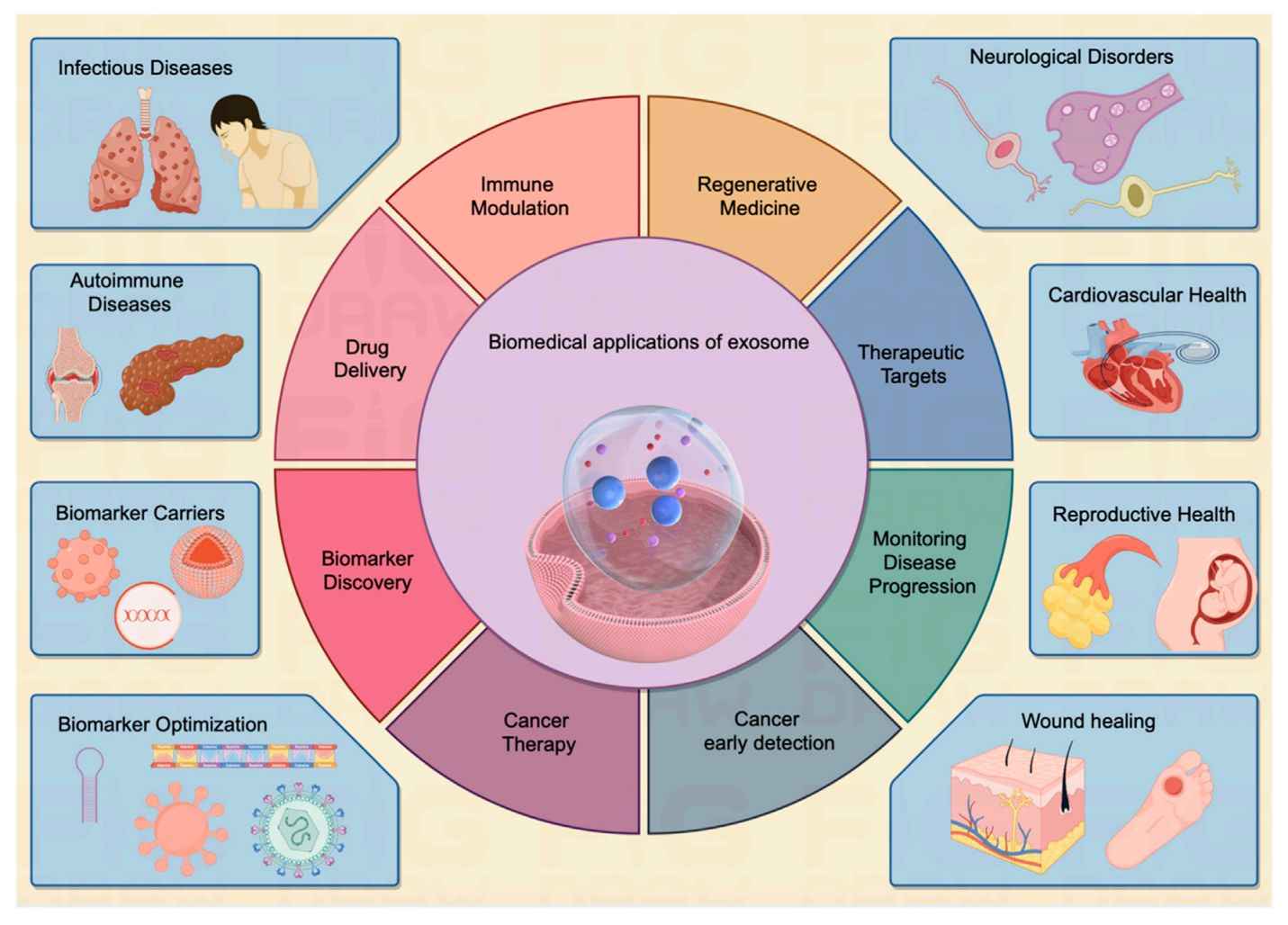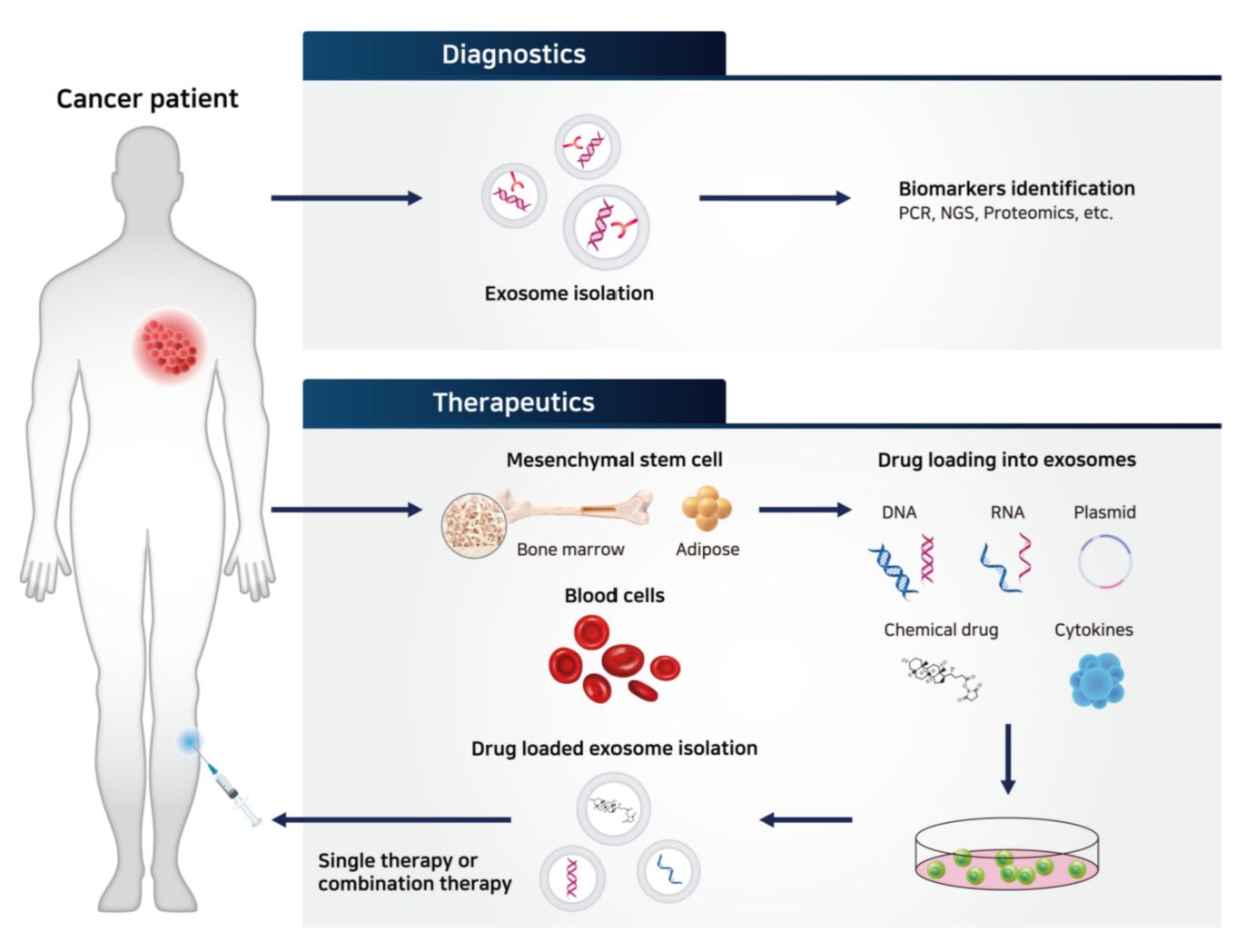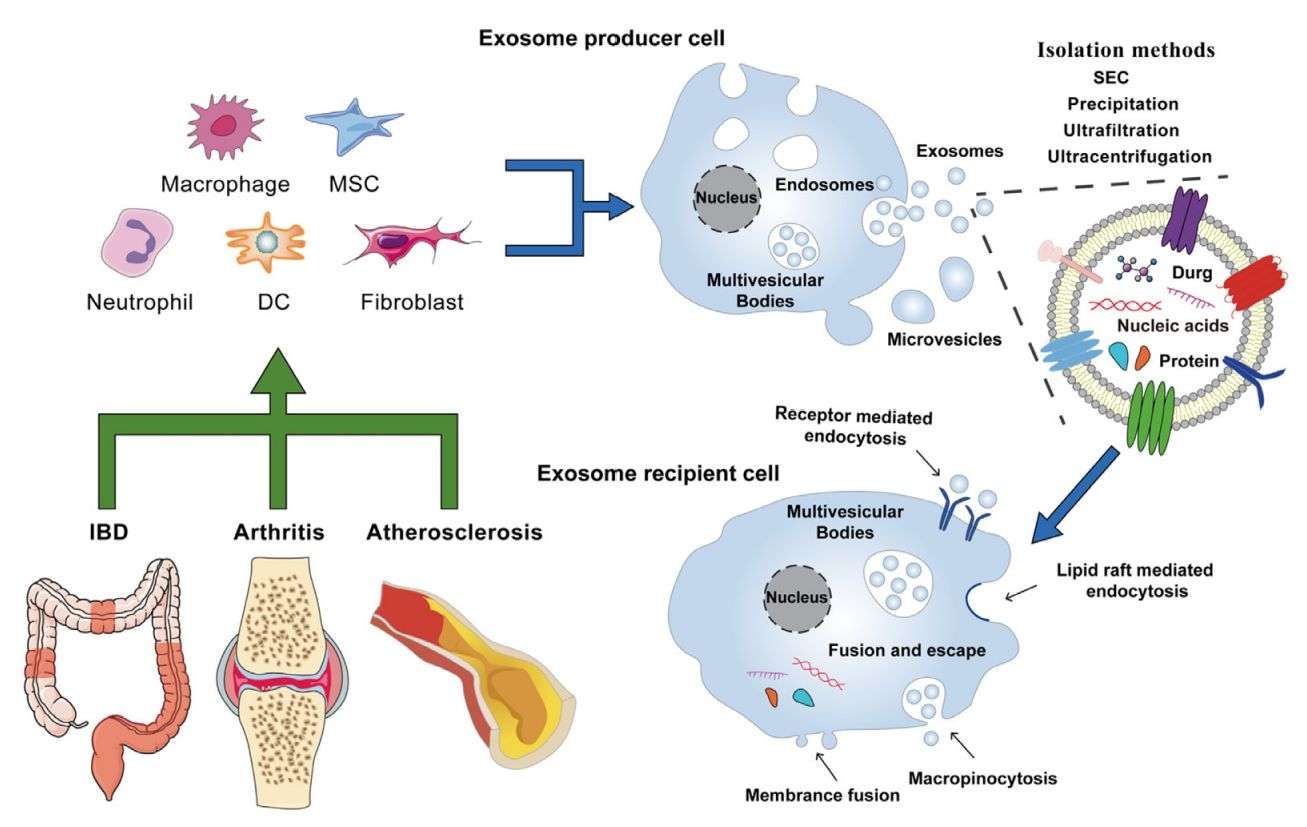Exosomes for Diagnosis and Treatment of Diseases
Exosomes are extracellular vesicles secreted by living cells and are important carriers of intercellular information transfer. Its interior carries a large number of specific proteins as well as functional DNA, mRNAs, miRNAs, etc., which are involved in physiological processes in vivo, such as cell communication, cell migration, pro-angiogenesis, and anti-tumor immunity, and are closely related to the onset and progression of a variety of diseases. It has been found that exosomal contents can be used as both diagnostic markers and specific targets for therapy.
 Figure 1. The exosome exerts multi-faceted biomedical potentials for human disease. (Wang Z, et al., 2024)
Figure 1. The exosome exerts multi-faceted biomedical potentials for human disease. (Wang Z, et al., 2024)
What are Exosomes?
| Parameters | Details |
| Size | The diameter is about 30~150 nm. |
| Density | The density is about 1.13~1.19 g/mL. |
| Structure | Double membrane vesicle-like structure vesicles. |
| Cell Source | Almost all types of living cells in the human body can produce exosomes. |
| Heterogeneity | Functional differences can exist between exosomes secreted by the same type of cell. |
| Distribution | Peripheral blood, urine, saliva, breast milk, ascites, amniotic fluid, and other body fluids. |
What is the Efficacy of Exosomes?
Immunomodulation - Exosomes can inhibit excessive inflammatory and immune responses, providing a more peaceful environment for the repair of damaged tissues. At the same time, by regulating the activity of immune cells, exosomes also help to enhance the body's overall immunity against infections and autoimmune diseases.
Drug Delivery - As exosomes have good biocompatibility and penetration, they can be used as drug carriers to deliver drugs precisely to the diseased area, improving therapeutic effects and reducing side effects.
Tissue Repair and Regeneration - Exosomes contain growth factors and cytokines, which can promote the repair and regeneration of damaged tissues. For example, in the process of skin damage repair, exosomes can promote the proliferation and migration of skin cells, accelerating wound healing.
Anti-oxidative Stress - Exosomes are rich in antioxidant substances, which can scavenge free radicals in the body and reduce cell damage caused by oxidative stress, helping to slow down the aging process.
Intercellular Communication - Exosomes can serve as a medium for intercellular information transfer and participate in a variety of physiological and pathological processes. For example, they can regulate cellular interactions in the tumor microenvironment and influence tumor growth and metastasis.
Diagnostic and Therapeutic Applications of Exosomes
Exosomes show great potential in disease diagnosis. Scientists are studying the association between the type, number, and size of exosomes and their contents with various diseases. Through these studies, exosomes are expected to become a novel biomarker for predicting the onset and progression of diseases.
Exosomes can be used as biological indicators for diagnosing various diseases and as therapeutic tools. Based on targeting, biocompatibility, and low immunogenicity, exosomes have become a delivery vehicle for a wide range of drugs and are a very promising tool for cell-free therapy.
Exosomes in Cancer Diagnostics and Therapies
Cancer research needs to know more about how exosomes are used to diagnose cancer. There is a link between the number of exosomes and the presence of tumors, and exosome contents are similar and specific to donor cells, reflecting their status. Therefore, exosomes are considered a novel tool for cancer diagnosis. In recent years, exosomes have been promising for clinical applications in tumor identification, imaging scan confirmation, and tumor load monitoring.
| Cat No. | Product Name | Source |
| Exo-CH06 | HQExo™ Exosome-MCF-7 | Exosome derived from human breast cancer, noninvasive cell line (MCF-7 cell line) |
| Exo-CH09 | HQExo™ Exosome-DAUD1 | Exosome derived from human burkitt lymphoma cell line (DAUD1 cell line) |
| Exo-CH10 | HQExo™ Exosome-HCT116 | Exosome derived from human colorectal carcinoma cell line (HCT116 cell line) |
| Exo-CH11 | HQExo™ Exosome-K-562 | Exosome derived from human pleural effusion, leukemia chronic myelogenous (K-562 cell line) |
| Exo-CH16 | HQExo™ Exosome-COLO1 | Exosome derived from human colon carcinoma (COLO1 cell line) |
| Exo-CH21 | HQExo™ Exosome-A375 | Exosome derived from human malignant melanoma cell line (A375 cell line) |
| Explore All Exosomes Isolated from Cancer Cell Lines | ||
In addition to being used in diagnostic procedures, several properties make exosomes a good choice for developing new cancer therapies. Studies have shown that tumor cells produce more exosomes than normal cells. Therefore, reducing the abnormally high number of exosomes in the blood to normal levels may be a viable treatment. In addition, exosomes can deliver therapeutic agents such as chemotherapeutic drugs, nucleic acids, and proteins to cancer cells, improving drug targeting and stability.
 Figure 2. Potential therapeutic applications of exosomes in cancer. (Choi JU, et al., 2020)
Figure 2. Potential therapeutic applications of exosomes in cancer. (Choi JU, et al., 2020)
Exosomes in Chronic Disease Diagnosis and Therapies
In the microenvironment of chronic diseases, immune cells and mesenchymal stem cells (MSCs) secrete a large number of exosomes, which act as intercellular communication vectors and regulate gene expression, thus participating in disease regulation. Exosomes are characterized by good biocompatibility, strong targeting, low toxicity, and high immunogenicity, and can selectively deliver therapeutic drugs to the site of pathogenesis through the interaction of surface antibodies or modified ligands with cell surface receptors. Therefore, the role of exosome-based delivery strategies in chronic diseases has received increasing attention.
 Figure 3. Exosomes have great potential in the treatment of chronic inflammatory diseases. (Wang C, et al., 2023)
Figure 3. Exosomes have great potential in the treatment of chronic inflammatory diseases. (Wang C, et al., 2023)
| Cat No. | Product Name | Source |
| Exo-HDBF-01 | HQExo™ Exosome-SDH-Alzheimer's plasma | Exosome derived from Single Donor Human Alzheimer's plasma |
| Exo-HDBF-03 | HQExo™ Exosome-SDH-Atopic Dermatitis plasma | Exosome derived from Single Donor Human Atopic Dermatitis plasma |
| Exo-HDBF-04 | HQExo™ Exosome-SDH-Benign Breast Conditions plasma | Exosome derived from Single Donor Human Benign Breast Conditions plasma |
| Exo-HDBF-08 | HQExo™ Exosome-SDH-Crohn's Disease plasma | Exosome derived from Single Donor Human Crohn's Disease plasma |
| Exo-HDBF-15 | HQExo™ Exosome-SDH-Breast Cancer Plasma exosome | Exosome derived from Single Donor Human Breast Cancer Plasma |
| Exo-HDBF-18 | HQExo™ Exosome-SDH-Kidney Cancer Plasma exosome | Exosome derived from Single Donor Human Kidney Cancer Plasma |
| Explore All Exosomes Isolated from Human Disease-state Body Fluids | ||
Exosomes, as messengers of intercellular communication carrying proteins, nucleic acids, and other biologically active substances, show great potential for the diagnosis and treatment of tumors and chronic diseases and thus have become a new favorite in biomedical research. With the continuous development of the exosome isolation process and engineering technology, standardized purified exosomes will become more feasible.
As a leader in exosome research, Creative Biostructure has the expertise and advanced instrumentation to provide clients with one-stop exosome services. If you are interested in our services, please feel free to contact us for more information.
References
- Wang Z, et al. Exosomes: a promising avenue for cancer diagnosis beyond treatment. Front Cell Dev Biol. 2024. 12: 1344705.
- Choi JU, et al. The Biological Function and Therapeutic Potential of Exosomes in Cancer: Exosomes as Efficient Nanocommunicators for Cancer Therapy. Int J Mol Sci. 2020. 21(19): 7363.
- Wang C, et al. Therapeutic potential of exosome-based personalized delivery platform in chronic inflammatory diseases. Asian J Pharm Sci. 2023. 18(1): 100772.
- Maqsood Q, et al. Exosomes in Cancer: Diagnostic and Therapeutic Applications. Clin Med Insights Oncol. 2024. 18: 11795549231215966.